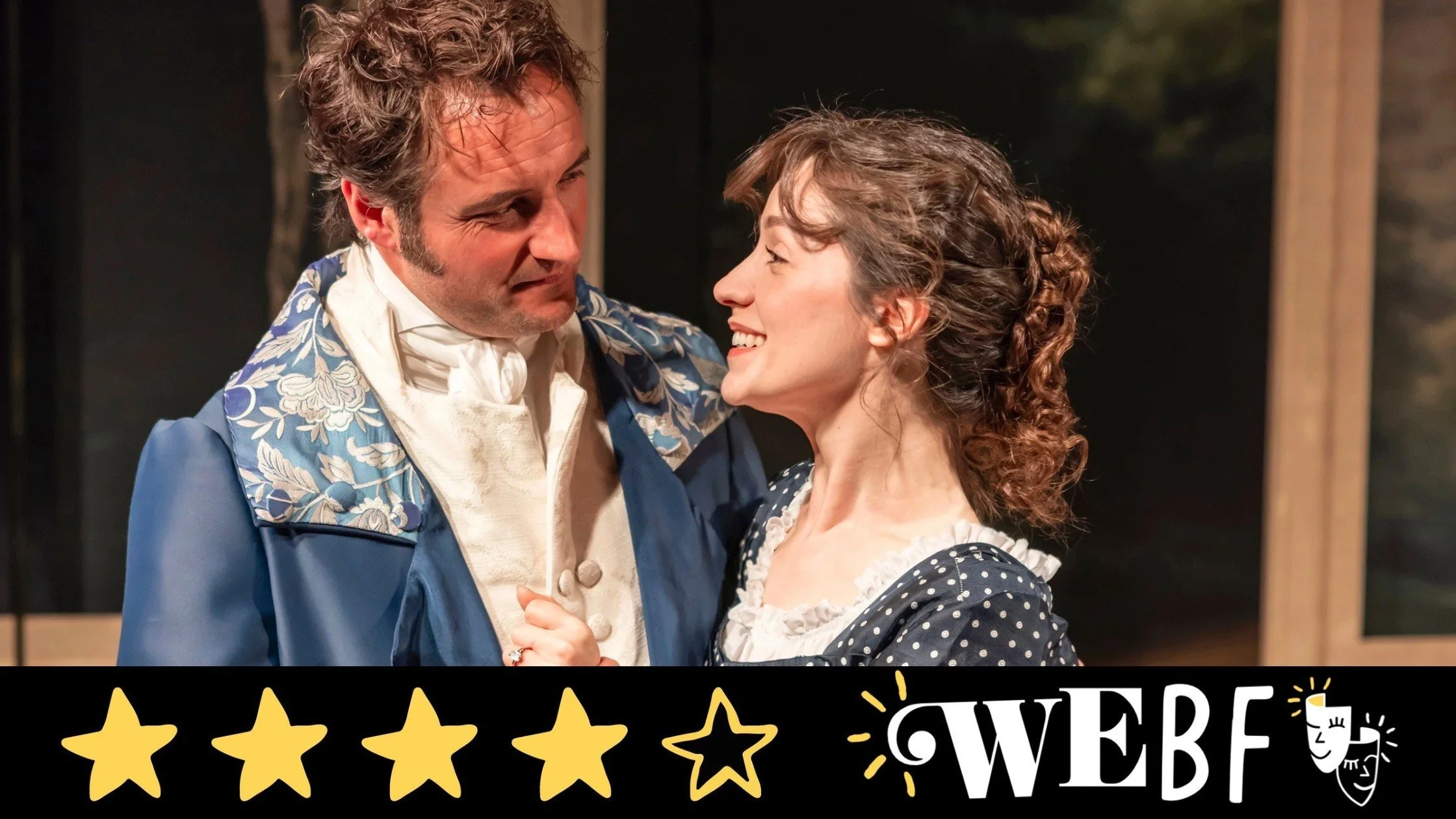Review: DEATH COMES TO PEMBERLEY, Theatre Royal Windsor - Tour
Photo credit: Pamela Raith
Having seen and enjoyed Death Comes to Pemberley at the Mill at Sonning, the charming intimate dinner theatre in Berkshire, we were intrigued to see how it had evolved to the traditional proscenium arch Theatre Royal at Windsor, as it begins an eight-playhouse tour around the South of England. It is the first time that Sally Hughes, the Mill’s Artistic Director, has toured a play after originating a production at her venue in its forty-year history and so it is an exciting bold move to re-stage it for the tour losing the auditorium entrances that often feature in her home theatre.
We can report that the transfer has gone well, and the show has evolved and improved in the process. Jonathan O’Boyle has taken over direction from Joe Harmston to reblock the show. The settings have been reworked to offer more location variation to cover scenes within Pemberley, the woods, the courtroom and jail, the Red Lion and Bidwell Cottage. The glorious image of the Derbyshire hills across the back of the stage sets the location and sliding panels are used to create interiors. The six panels are moved to different patterns, almost as if Elizabeth Darcy is trying to put together the pieces of the puzzle to solve the mystery.
Writers Rachel Wagstaff and Duncan Abel have adapted PD James’ novel to continue the story of Jane Austen’s 1813 novel Pride and Prejudice, and it is sure to attract Austin fans in the 250th anniversary year of her birth. They will enjoy meeting the characters from the book six years later just as the Napoleonic French invasion threatens the country. It is the eve of the annual Pemberley Ball, which reinforces the Darcy’s status in society and to which Wickham and his wife, Lydia, have been excluded.
When Lydia (Mogali Masuku) arrives unannounced at Pemberley in a distressed state with the coachman from the Red Lion, Pratt (Paul Jerricho), the Darcy status is threatened when a search of Pemberley woods finds Wickham (Sam Woodhams) bent over the body of Captain Denny and claiming responsibility for his friend’s death. It looks like a closed case for magistrate Hardcastle(Todd Boyce) who is summoned to investigate. Wickham refuses to explain the circumstances to protect the honour of someone involved. Can the Darcys find out what really happened?
The challenge to the investigation is that Fitzwilliam Darcy ( a good performance from ex-Eastenders actor James Bye) would rather see Wickham gone from his life, despite their childhood friendship as his behaviours threaten Darcy’s standing. Elizabeth Darcy (a calm and serene Jamie Rose Duke) still harbours fondness for Wickham and is determined to find out the truth and so sets out to try and save Wickham from the gallows. What does the enigmatic Colonel Fitzwilliam (Sean Rigby in magnificent military form) know of what went on? There is delightfully comic interference and acerbic asides from the snobbish Lady Catherine De Burgh (Sarah Berger) to add to the fun.
There are many characters in the tale and five out of eleven cast members are required to double up (or more) in the parts. The whole Bidwell family who live in the woods are played by characters from the House but at least it gives them a chance to show their acting range with strong contrasts in the characterisations between the poor underclass and the society elite. It adds an element of fun to the production as they exit in time to re-enter in a different guise!
On the Windsor press night, a special mention must be made for Joe Bence who stepped in as Alveston, the love interest of Georgina (Celia Cruwys-Finnigan) in a pleasant subplot around an18th century piano forte. He does exceptionally well in playing the role with plenty of sparkle and energy and clearly enjoying (with the cast) his first performance!
This is a standalone murder mystery but is given extra interest by its inspiration by Jane Austen’s novel. Elizabeth is confirmed as a woman ahead of her time, determined to find a role beyond being a loyal wife and she emerges as the heroine again amongst a group of “honourable” men who behave with dubious motives of status, greed and sex. It confirms again why Jane Austen’s characters continue to resonate with audiences 250 years after her birth.
**** Four stars
Reviewed by: Nick Wayne

